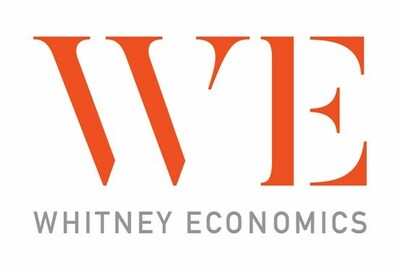Whitney Economics Report Indicates Industry Trend is Unsustainable
PORTLAND, Ore., April 2, 2024 /PRNewswire/ — Whitney Economics, a global leader in cannabis and hemp business consulting, data, and economic research, has published its 2023 U.S. Cannabis Delinquent Payments Report for the U.S. Adult-use and Medical Cannabis Industry. In total, the total delinquent payments have exceeded $3.8 billion and without regulatory intervention, are expected to top $4.2 Billion in 2024.
Whitney Economics Delinquent Payments Survey
In Q4 2023, Whitney Economics deployed a survey to ask cannabis operators and ancillary businesses about the impact of delinquent payments on their operations. The survey asked respondents for a broad set of inputs related to A/P and A/R issues. Respondents also had a chance to offer direct feedback. Additionally, Whitney Economics conducted direct interviews and triangulated/validated data against other sources, including regulators.
Key findings from the survey include:
- Total delinquent accounts receivables are approximately $3.8 billion
- This amount equates to 1.6 months of legal ($28.8 billion) U.S. cannabis retail revenues in 2023
- Cannabis cultivation is the hardest-hit sector in the U.S. supply chain; retail is the least-impacted
- Impacts are widespread throughout the industry, but are impacting smaller and minority operators the most
- 44% of the respondents indicated that delinquent receivables were impacting their ability to service their debt while 34% indicated that is impacting their ability to pay their taxes
- 57.3% of survey respondents indicated that delinquent accounts receivables have a greater impact on their cannabis business than federal tax code 280E
Note: These numbers do not include payments related to industrial hemp.
Cannabis is a Tough Environment
Data indicate that 2023 was a tough year for many cannabis operators in the U.S. In fact, overall legal cannabis revenues declined in 10 states in 2023. With declining revenues and compressed margins cash is king right now.
Brett Gelfand, of Cannabiz Credit Association added, “We are seeing businesses struggle to maintain adequate cash flows. We are trying to help the industry proactively address these issues by providing credit assessments of cannabis businesses as well as by helping operators via the collections process.”
“I would love to pay my bills, if others would simply pay me first so I could do so.” Delinquency Survey Respondent
“The pressures created by current macroeconomic factors and regulatory policies have incentivized operators to stop paying their suppliers,” Beau Whitney, of Whitney Economics commented. “This data further affirms the fact that the cannabis industry is struggling. Unless there is some form of federal and state regulatory intervention, the issues associated with the lack of payments will only get worse.”
A copy of the delinquency report can be downloaded at https://www.whitneyeconomics.com/2024-us-cannabis-delinquency-report
Upcoming Whitney Economics reports: Cannabis Employment (April), Cannabis Debt Financing Projections (May), Cannabis Beverages Analysis (June)
For more information about the economics of cannabis and hemp, please contact Beau Whitney, Chief Economist, +1 503-724-3084 or beau@whitneyeconomics.com
About Whitney Economics whitneyeconomics.com
Portland, Oregon based Whitney Economics is a global leader in cannabis and hemp business consulting, data, and economic research, supporting hemp and cannabis operators, investors & regulators. Whitney Economics does not take a position on the legalization of cannabis, nor does it take positions on proposed legislation.
![]() View original content to download multimedia:https://www.prnewswire.com/news-releases/cash-starved-cannabis-operators-topped-3-8-billion-in-delinquent-payments-in-2023–302104100.html
View original content to download multimedia:https://www.prnewswire.com/news-releases/cash-starved-cannabis-operators-topped-3-8-billion-in-delinquent-payments-in-2023–302104100.html
SOURCE Whitney Economics

Featured image: Megapixl © 08mayorova








